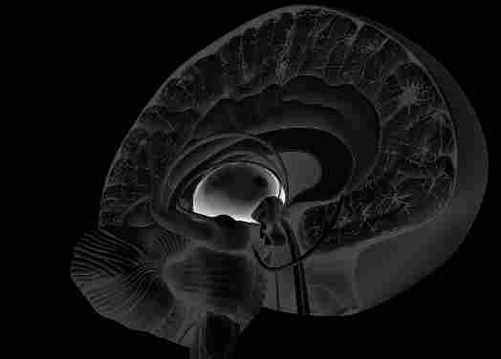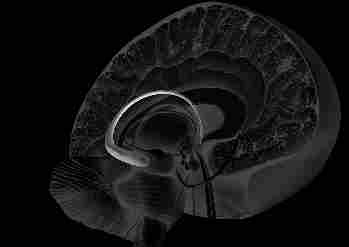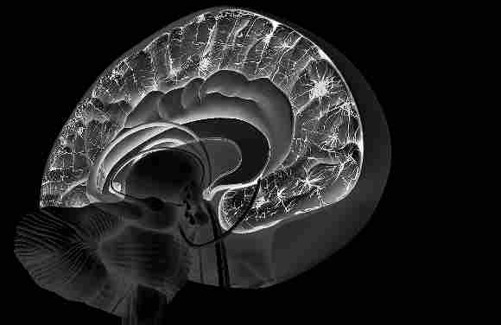Switch on Your Brain: The Key to Peak Happiness, Thinking, and Health (24 page)
Read Switch on Your Brain: The Key to Peak Happiness, Thinking, and Health Online
Authors: Dr. Caroline Leaf
Tags: #Health; Fitness & Dieting, #Christian Living, #Mental Health, #Christian Books & Bibles

THE 21-DAY BRAIN DETOX PLAN
to reject the presently activated thoughts and the incoming
information, or you can let the information make its way
into your mind, soul, and your spirit, eventually subsiding
in your nonconscious and becoming automatized, dominat-
ing who you are. Even though you can’t always control your
circumstances, you can make fundamental choices that will
help you control your reaction to your circumstances and
keep toxic input out of your brain.
QUESTION: Do you feel like a victim of or a vic-
tor over what is swarming through your mind at
the moment from the external and internal signals?
Brain Structures and Circuits That Help You Make
Good Choices
amygdala
hippocampus
The amygdala and hippocampus, and their connected circuits,
can help you make good choices. The amygdala deals with
the passionate, perceptual emotions attached to incoming
164
_Leaf_SwitchOnBrain_LS_mw.indd 164
5/16/13 1:34 PM
Gather
thoughts and all the thoughts already in your head. The hip-
pocampus deals with memory and motivation.
This is where you consciously step up to center stage; you
need to choose, and decide whether or not these incoming
thoughts will become part of who you are. Let’s look more
closely at how you control this decision to accept or reject
information.
QUESTION: Did you know you are able to accept
or reject the thoughts flowing through your mind?
The Amygdala: Perceptual Library
The amygdala, a double almond–shaped structure located
in your brain, is designed to keep you emotionally alert. When
you become toxic in your thinking, it steps up to protect you
from any threat to your body and mind—such as danger or
stress. It puts the passion behind the punch of memory forma-
tion by influencing another structure that is very important
to memory formation, the hippocampus, enabling you to
give more focused attention to your existing memories. The
amygdala is basically designed to deal with positive love-based
emotions like joy and happiness, but it doesn’t work as well
when you are in a negative state of mind.
The Thalamus Acts Like a Transmitter Station
The thalamus (deep in the middle of the brain) functions
like a transmitter station, alerting the amygdala of any incom-
ing information from the five senses. How does it do this?
The amygdala functions like a library, storing the emotional
perceptions that occur each time a thought is built. In other
words, every time you build a memory, you activate emotions.
The endocrine system in the brain has to release the correct
165
_Leaf_SwitchOnBrain_LS_mw.indd 165
5/16/13 1:34 PM

THE 21-DAY BRAIN DETOX PLAN
thalamus
chemicals—the molecules of emotion and information—
necessary to build healthy or toxic memories. Because the
amygdala is in constant communication with the hypothala-
mus, which secretes chemicals in response to your thought
life, you are able to feel your body’s reaction to your thoughts.
These physical reactions—rapid heartbeat and adrenaline
rushes—force you to decide whether to accept or reject the
information, basing your decision on how you feel physically.
To help you even more, the amygdala has lines of com-
munication connected to the frontal lobe, which controls
reasoning, decision-making, analyzing, and strategizing—all
executive-level functions. This connection enables you to
balance the emotions you physically experience in your body
and allows you to react reasonably. Here is the exciting part:
At this moment you can choose
not
to think about this issue
anymore, and those temporary thoughts will disappear.
QUESTION: You do not have to be dominated
by your perceptual library—in other words your
166
_Leaf_SwitchOnBrain_LS_mw.indd 166
5/16/13 1:34 PM

Gather
emotions. Do you feel dominated by your feel-
ings that have arisen out of the thoughts active
in your mind?
The Hippocampus: Memory Converter
If you don’t manage to stop thinking about the issue, how-
ever, all the information, including the awakened toxic or
nontoxic attitude, will flow into a sea horse–shaped structure
called the hippocampus.
The hippocampus is a sort of clearinghouse for thoughts.
It classifies incoming information as having either short- or
long-term importance and files it accordingly, converting tem-
porary thoughts into permanent thoughts that become part
of who you are (a lot of this happens at night while you are
sleeping). To do this, the hippocampus has to work with the
central hub of the brain—a group of structures with circuits
that integrate all the activated memories and work with the
hippocampus to convert information into your permanent
memory storage.
hippocampus
167
_Leaf_SwitchOnBrain_LS_mw.indd 167
5/16/13 1:34 PM
THE 21-DAY BRAIN DETOX PLAN
This is where you begin some serious reflection in order
to make some life-changing decisions.
QUESTION: Ask yourself, “Do I want this infor-
mation to be a part of me?”
Stress
A good point to remember is that toxic memories create the
negative stage two and negative stage three of stress. Stage
one of stress is good and keeps you alert and focused. Stage
two and three are normal stress gone wrong.
The hippocampus is extremely vulnerable to stress because
it is rich in stress hormone receptors that are normally used to
reinforce memories. These receptors are like tiny doorways on
cells that receive chemical information. For these brain cells,
excessive stress is almost like an explosion, causing the hippo-
campus to lose cells and shrink. This affects the communica-
tion between the hippocampus and the central circuits of the
brain, keeping it from building new good thoughts (memories)
as well as causing memory loss. This is seen a lot in depression,
Alzheimer’s, dementias, and other neuropsychiatric disorders.
QUESTION: Toxic thoughts are the result of bad
choices. Stress stages two and three are your body’s
reaction to toxic thoughts. Can you feel the stress
reaction—heart pounding, adrenaline pumping,
or muscles tensing up in your body?
1. Sensory information flows into the brain through the
five senses.
168
_Leaf_SwitchOnBrain_LS_mw.indd 168
5/16/13 1:34 PM
Gather
2. Existing memories in the nonconscious are activated.
3. This activates memories to move from nonconscious
to the conscious mind and attitudes are invoked.
4. The hypothalamus responds to the attitude by releasing
chemicals necessary for memory building and emotions.
5. This activates the amygdala to recall linked emotional
perceptions and to start building in new emotional
perceptions.
6. All this information enters the hippocampus, which is
involved in converting short-term memory to long-term
memory.
7. All this electromagnetic, chemical, and quantum physics
activity moves to the front of the brain.
Let’s move to the reflection stage and see how the hippo-
campus works with the central hub circuits of the brain in
building thoughts.
169
_Leaf_SwitchOnBrain_LS_mw.indd 169
5/16/13 1:34 PM
_Leaf_SwitchOnBrain_LS_mw.indd 170
5/16/13 1:34 PM
12
Focused Reflection
Step 2
It is always fun to see science catching up with the Bible,
as we discussed in part 1. Focused reflection is an example
of this. It is an ancient biblical principle most of us know.
But it is also the current rage in neuroscience, and there are
hundreds of studies with headlines like
“Mindfulness Meditation May Relieve Chronic Inflam-
mation”1
“Evidence Supports Health Benefits of ‘Mindfulness-Based
Practices’”2
“Breast Cancer Survivors Benefit from Practicing Mind-
fulness-Based Stress Reduction”3
“Don’t Worry, Be Happy: Understanding Mindfulness
Meditation”4
“Mindfulness Meditation Training Changes Brain Struc-
ture in Eight Weeks”5
You get the idea.
171
_Leaf_SwitchOnBrain_LS_mw.indd 171
5/16/13 1:34 PM
THE 21-DAY BRAIN DETOX PLAN
It Always Boils Down to One Thing
Although a lot of these studies talk about Eastern medita-
tion techniques, what it boils down to every time is deep,
intellectual, disciplined thinking with attention regulation,
thinking, body awareness, emotion regulation, and a sense of
self that changes the brain positively. Consequently, people
gain health, happiness—and peace—exactly the instruction
and consequence of Philippians 4:8: “Finally, brothers and
sisters, whatever is true, whatever is noble, whatever is right,
whatever is pure, whatever is lovely, whatever is admirable—
if anything is excellent or praiseworthy—think about such
things” (NIV). In fact, throughout the book of Proverbs we
are instructed to gain wisdom and meditate on knowledge
until we understand.
Getting Out of a Toxic-Thinking Block
If you are going to get out of any toxic-thinking block, you
need to think, understand, and apply the wisdom you gain.6
Thankfully, you have all the structures and physiological
processes at your disposal to do this. Neuroplasticity (key 3)
and quantum physics (key 7) are for your benefit and can help
you enjoy every day. Don’t forget that, as a neuroplastician,
you can do your own brain surgery. This means no thought
should ever be allowed to control you (see chaps. 1 and 2).
So once you have gone through the whole gathering aware-
ness step above—which disciplines you to be careful of what’s
going into your brain as well as what is coming out from
inside—then you need to go deep and focus your reflection.
As you apply keys 4 and 5 in this step (catch your thoughts
and enter into directed rest), an incredible change happens
172
_Leaf_SwitchOnBrain_LS_mw.indd 172
5/16/13 1:34 PM
